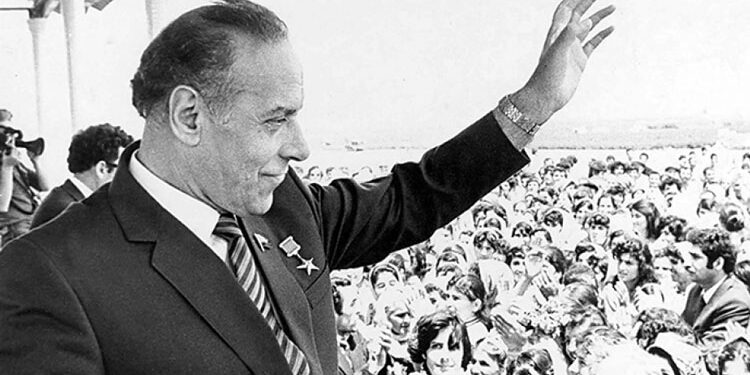Dr. Vasif Huseynov
Head of Department at the Centre for Analysis of International Relations (AIR Centre), Baku, Azerbaijan
On 10 May, Azerbaijan celebrates the 102nd anniversary of the birth of Heydar Alirzá oglú Aliyev, the national leader whose name is closely related to the creation of modern Azerbaijan. Heydar Aliyev, born in 1923 in the Nakhichevan region of the Azerbaijan Soviet Republic, lived through turbulent times and emerged not only as a prominent figure of the Soviet executive, but even more importantly, he was the architect of independent Azerbaijan. His long and complex political mandate, marked by great dedication to his nation, consolidated him as the leader of modern history of Azerbaijan.
During his political term from 1969 to 1982, Azerbaijan underwent a major transformation. This period was marked by a resurgence of national identity, strong industrial growth and investment in human capital. Heydar Aliyev was aware of the importance of training young people. Thousands of them were sent to high-level universities in the USSR to gain experience in industrial and administrative areas. National income increased, large-scale factories were built and Azerbaijan became a vital component of the Soviet industrial complex. It should be noted that under his leadership, Azerbaijan laid the foundations for a defence industry and technological infrastructure which became key components of national capacity and laid the foundation for independence. These industrial developments were not mere economic milestones, but strategic pillars for the future state. A diversified, resilient and potentially self-sufficient national economy capable of withstanding external pressures was planned.
In 1982, Heydar Aliyev was promoted to the Politburo of the Communist Party of the Soviet Union and appointed First Vice-President of the Cabinet of Ministers of the USSR-one of the highest positions in the Soviet hierarchy. But even in the heart of Moscow, he continued to defend Azerbaijani interests, often risking his life.
With the dissolution of the Soviet Union, chaos broke out and in the late 1980s and early 1990s, Heydar Aliyev once again assumed a crucial role as the nation’s leader. Following the tragic events of Black January in 1990, when Soviet troops murdered dozens of civilians protesting against Soviet occupation in Baku, Aliyev publicly condemned the atrocities perpetrated by Moscow. Later he returned to Najchivan and played a crucial role in the regional government, eventually being elected president of its Supreme Assembly.
Amid the national crisis of 1993, when Azerbaijan was facing civil unrest, economic collapse and the threat of territorial disintegration, Aliyev was invited by the Azerbaijani people to the capital, Baku. In response to the will of the people, he assumed the leadership of the Supreme Soviet on 15 June and shortly thereafter was elected President of the Republic of Azerbaijan, which had regained its independence in 1991. This date is now commemorated as the Day of National Salvation.
Heydar Aliyev’s presidency (1993-2003) was characterized by state building, institutional consolidation and strategic diplomacy. Aliyev overcame the difficult first years of independence with determination and vision, laying the constitutional and political foundations of modern, secular and committed to internationalization Azerbaijan. Under his leadership, the country adopted a balanced foreign policy, began to attract significant foreign investment, especially in the energy sector, and promoted economic reforms that would shape its future as a strong and sovereign state.
Today, the political stability of Azerbaijan, its growing economy, its robust military strength and its influential international role are a direct reflection of Heydar Aliyev’s vision. His contribution was not limited to political achievements or the constriction of infrastructure; he revitalized the Azerbaijani spirit, national consciousness; he instilled a sense of unity and pride. As a result, Azerbaijanis believed in their future. Their insistence on preserving language, religion and culture, even under the Soviet regime, ensured the integrity of national identity, a crucial factor in the post-independence resurgence.
When he came to power in 1993, the independence and territorial integrity of newly independent Azerbaijan was threatened by internal instability, economic collapse and the consequences of the conflict between Armenia and Azerbaijan. The First Karabagh War resulted in the occupation of about 20% of the internationally recognized territory of Azerbaijan, including the Karabagh region and seven surrounding districts, by the Armed Forces of neighboring Armenia. More than 700,000 Azerbaijanis were expelled from these territories, adding to the humanitarian challenges created by the expulsion of up to 300,000 Azerbaijanis from the territories of modern Armenia in previous years.
In this context, Aliyev prioritized political stability, state-building and applied a balanced foreign policy with regional and global powers. His firm stand on the liberation of the occupied territories was the basis of the country’s domestic and foreign policy during his presidency. This strategic direction was institutionalized and subsequently materialized through the successful military operations conducted by the Armed Forces of Azerbaijan in the years 2020 and 2023, which resulted in the liberation of the Karabagh region and adjacent districts.
Aliyev’s legacy has materialized not only in state institutions, but also in the pillars of sovereignty and territorial integrity of Azerbaijan. Reflecting on his legacy, President Ilham Aliyev declared: “Heydar Aliyev is a powerful personality who successfully managed to pull his people out of the complex historical and political difficulties of the time and lead them to independence through constant struggle”.
In 2025, the 102nd anniversary of the birth of Heydar Aliyev coincides with the commemoration of the “Year of the Constitution and Sovereignty” of the country. This fact highlights the importance of the values he promoted: sovereignty, unity and defence of national interests. After decades of occupation, conflict and challenges, Azerbaijan has regained control over its territories and consolidated its position as an independent state. Much of this progress is based on the foundations laid during the term of office of Heydar Aliyev. With his clear vision and strong leadership, the country has weathered the most difficult years and continues to forge its course. For his achievements in the modern history of the country, Heydar Aliyev was recognized as a national leader.






